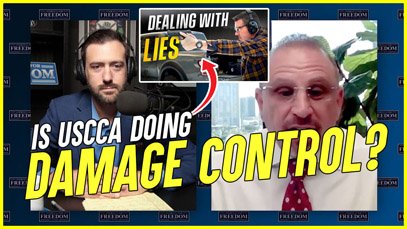Criminal Defense Attorneys React to 7-Eleven Workers Who Beat Robber
October 10, 2023
In a viral video inside a 7-Eleven convenience store, two shopkeepers physically subdue an alleged repeat shoplifter. The video has sparked widespread public discourse, with many applauding the shopkeepers’ actions – while others question if the force used crossed a legal line. Criminal defense attorneys Andrew Marcantel and Marc J. Victor delve into the legal dynamics of this case, providing an analysis on what the law allows, where the lines are drawn, and how this case might play out in court.
Incident Overview
The footage shows a masked individual sweeping items off store shelves into a large trash can. The man ignores verbal warnings from the store’s employees. At one point, he reached toward his back pocket in a manner suggesting he might be armed.
The suspect is behind the store counter. As the situation escalates, one shopkeeper physically restrained the man while the other struck him multiple times with what appears to be a broom handle. The shoplifter resisted primarily to shield himself from the blows, rather than retaliate.
After stating that he was “done,” the suspect was struck again by one of the shopkeepers. The employees then discussed whether the man had a weapon, ultimately concluding that he had likely fabricated the threat. They debated whether to detain him until law enforcement arrived but decided to let him go.
“There is no argument that he’s in a place where he knows he’s not allowed to be. It sure doesn’t look like he’s planning to go up front and pay for the things.”
Legal Analysis
The Initial Encounter: Theft or Armed Robbery
Initially, the incident appeared to be a case of theft. However, when the suspect reached toward his back pocket, it created uncertainty as to whether he might be armed. The attorneys introduce a relevant legal concept: the reasonable mistake of fact. This doctrine applies when a person reasonably – but mistakenly – believes certain facts that would justify their actions under the law. If the shopkeepers reasonably believed the suspect had a weapon, their response – particularly the use of physical force – could be interpreted as self-defense or defense of others. Whether their actions were justified would depend on if their belief in the presence of a threat was considered reasonable under the circumstances.
“Even if it’s true that he doesn’t have a gun… if the shopkeepers reasonably believed or in some states, simply had a good faith belief that he actually had a deadly weapon and could have used it at any time, there might be an argument here.”
Use of Force: When Does It Become Excessive?
The video shows one shopkeeper restraining the suspect while the other repeatedly strikes him with a broom handle. This may fall under ordinary physical force.
“At the beginning, you can use ordinary physical force to protect property… Whether that’s smart or not is a different question.”
The turning point in the video occurs when the suspect is subdued and no longer actively resisting. At one point, the suspect is heard saying, “Okay,” interpreted as him submitting. Despite this, the shopkeepers continue striking him. The principle of proportionality in use-of-force law permits only the minimum amount of force necessary to neutralize a threat. Anything beyond that, especially if it appears retaliatory, can cross into criminal conduct. Such acts could be classified as assault or even aggravated assault with a deadly weapon.
“It starts looking like excessive force to me… Any prosecutor is definitely going to take that and say that just looks like pure revenge.”
Defensive Legal Theories
Despite the seemingly excessive beating, the attorneys discuss several strong potential legal defenses for the shopkeepers:
• Defense of Others: One shopkeeper was physically entangled with the suspect. The second shopkeeper, wielding the stick, could argue he was using force to protect his coworker from potential harm.
• Self-Defense Based on Reasonable Belief of a Weapon: Even if the suspect did not actually possess a firearm, the belief that he did (and the actions indicating as much) can legally justify continued use of force until the threat is neutralized.
• Shopkeeper’s Privilege: Many states recognize the “Shopkeeper’s Privilege,” which allows store employees to detain a suspected shoplifter on store premises in a reasonable manner and for a reasonable period of time, while waiting for law enforcement.
• Citizen’s Arrest: In some jurisdictions, civilians may perform a citizen’s arrest when they witness a felony occurring. If this case rises to the level of armed robbery, the shopkeepers could argue they were lawfully detaining the suspect for police.
• Intent and Target of Force: This could support the claim that the force, was intended to be non-lethal and aimed only at immobilizing the suspect—not injuring him seriously.
“He’s not hitting this guy in the head. He’s hitting him on the legs and the rear end… Even though he’s using a dangerous instrument, he’s really not using deadly physical force.”
Public Reaction and Policy Considerations
The attorneys also discuss how public sentiment around this case may influence prosecutorial decisions. In jurisdictions where prosecutorial discretion is influenced by public safety concerns and community values, this argument could carry significant weight. This case received many online commentators that praised the shopkeepers’ actions.
“There’s a public policy argument here… What type of message does your prosecutor’s office want to send to the public about law-abiding shop owners trying to keep their property from being stolen?”
Conclusion: Reasonableness is the Ultimate Test
As with all use-of-force cases, the legal analysis boils down to one critical question: Was the conduct reasonable under the circumstances? That’s the question jurors must answer, should charges be filed. This case offers a robust and nuanced set of legal tools which range from mistake of fact, to third-party defense, and citizen’s arrest laws.
“They’re not held to a standard of perfection it’s a standard of reasonableness.”
If you would like to know more about our law firm and how our self-defense protection program Attorneys On Retainer can help you, please call 866-404-5112 or email us.



